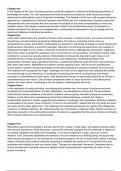Chapter one
In the Allegory of the Cave, Socrates presents a powerful metaphor to address the philosophical problem of
knowledge and reality. The cave symbolizes the world of illusions and opinions, while the journey outside
represents the philosopher's pursuit of genuine knowledge. The shadows on the cave wall represent deceptive
appearances, highlighting the distinction between mere beliefs and true understanding. Socrates argues that
philosophers who have escaped the cave and seen the sunlight of truth bear a responsibility to return and
enlighten others. This allegory underscores Socrates' belief in the transformative power of philosophy to
elevate individuals from ignorance to enlightenment, emphasizing the philosopher's duty to engage with the
world and challenge conventional perceptions.
Chapter two
In the realm of philosophy, the question of human nature has been a central concern, and various schools of
thought have provided distinct perspectives. Rationalism, for instance, posits that human nature is
characterized by reason and intellect, emphasizing the capacity for individuals to engage in critical thinking and
logical analysis. Descartes, a prominent rationalist, believed in an enduring and autonomous self capable of
independent thought. On the contrary, Darwinian evolutionary theory challenges this perspective, suggesting
that human nature is shaped by adaptation and survival instincts over generations. According to Darwin, traits
beneficial for survival are naturally selected. Existentialism introduces the idea that human nature is not
predetermined but created through individual choices and experiences, emphasizing freedom and
responsibility. Feminism adds a gendered dimension, questioning traditional views of human nature that have
often been male-centric. Materialism and dualism provide opposing views, with the former asserting that
human nature is rooted in physical processes and the latter proposing a separation between mind and body.
The relational self, as proposed by Hegel, challenges the notion of an independent self, asserting that identity
is formed through social interactions. Functionalism emphasizes the role of consciousness and mental
processes in understanding human nature, while behaviorism focuses on observable behaviors as the key to
comprehending human nature. Each of these perspectives offers a unique resolution to the philosophical
problem of human nature, contributing to the rich tapestry of philosophical discourse.
Chapter three
In the exploration of reality and being, one philosophical problem lies in the nature of existence and what
constitutes the fundamental fabric of reality. Materialism, as exemplified by thinkers like Thomas Hobbes,
posits that the primary substance of the world is material, with everything reducible to physical components.
Idealism, on the other hand, represented prominently by George Berkeley, contends that reality is
fundamentally spiritual or mental, suggesting that existence is contingent upon perception. Berkeley's idealism,
encapsulated in the dictum "esse est percipi" ("to be is to be perceived"), asserts that the only things that exist
are minds and the ideas within them. This challenges the materialist perspective by rejecting the independent
existence of material substance. By emphasizing the role of perception in defining reality, idealism provides an
alternative resolution to the philosophical problem of existence, suggesting that the nature of being is intricately
tied to mental experiences and consciousness.
Chapter Five
Rationalism posits that knowledge is primarily derived from reason, innate ideas, and logical processes rather
than sensory experiences. René Descartes, a prominent rationalist, grappled with the challenge of skepticism
by seeking indubitable foundations for knowledge. In his famous statement "Cogito, ergo sum" (I think,
therefore I am), Descartes establishes the certainty of his own existence as a thinking being. He argues that
while sensory perceptions can be doubted due to potential deception, the act of doubt itself confirms a thinking
subject. Descartes then employs deductive reasoning to establish the existence of a benevolent God, who
guarantees the reliability of clear and distinct ideas. Through this rationalistic framework, Descartes aims to
secure foundational knowledge immune to skeptical doubt, emphasizing the supremacy of reason in the
pursuit of certainty.




